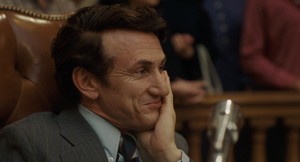MILK: 4 STARS
 Anyone who thinks that history does not repeat itself need look no further than the new Gus Van Sant film Milk for proof to the contrary. As the recent vote on California’s Proposition 8 proposal to “change the California Constitution to eliminate the right of same-sex couples to marry,” hangs in the air the movie’s story of San Francisco Board of Supervisors Harvey Milk’s 1978 battle against Proposition 6 brings into focus how little has changed in the fight for gay rights. Dubbed the Briggs Initiative, Milk defeated the law which would have banned gays and lesbians from working in California’s public schools.
Anyone who thinks that history does not repeat itself need look no further than the new Gus Van Sant film Milk for proof to the contrary. As the recent vote on California’s Proposition 8 proposal to “change the California Constitution to eliminate the right of same-sex couples to marry,” hangs in the air the movie’s story of San Francisco Board of Supervisors Harvey Milk’s 1978 battle against Proposition 6 brings into focus how little has changed in the fight for gay rights. Dubbed the Briggs Initiative, Milk defeated the law which would have banned gays and lesbians from working in California’s public schools.
Sean Penn plays the real-life Harvey Milk, a native New Yorker who, just after his fortieth birthday left behind his conservative, closeted life on the East coast for the more freewheeling San Francisco. “I’m forty years old,” he says, “and I haven’t done a thing I’m proud of.” When he and his lover Scott Smith (James Franco) bump up against the Eureka Valley Business Association’s “no gays allowed” policy Milk is pushed toward political activism. After several failed attempts at running for office, (and adopting the unofficial title of The Mayor of Castro Street), he becomes America’s first openly gay man to be elected to public office after winning a seat on San Francisco’s Board of Supervisors in 1977. His meteoric rise, though, is cut short the following year when he and Mayor George Moscone (Victor Garber) are assassinated by former city supervisor Dan White (Josh Brolin).
In this politically aware time Gus Van Sant has made a biopic about a an important political figure that pays less attention to the biography aspect and more to the issues that came to define Harvey Milk’s life. We don’t meet Harvey until the eve of his fortieth birthday, just as his political awareness was starting to blossom. Eight years later he was dead, so, unlike the recent W., Oliver Stone’s look at George W. Bush’s life, which dug into the president’s past, Milk focuses its energy on the bigger picture of gay rights and how Milk became an icon and martyr for gay pride. Van Sant sets the stage for Harvey’s rise to prominence, effectively creating a sense of time and place with the liberal use of archival news footage and careful attention to 1970s period details. Van Sant’s use of grainy film stock completes the illusion, making this look like an artifact from the 1970s.
Penn fully embraces Milk, from the thick New York accent that characterized his speech to the goofy grin that endeared the real-life activist to his supporters, both gay and straight. (“I know I’m not what you expected,” he would say, grinning, to straight audiences, “I left my high heels at home…”) It’s a strong Oscar worthy performance, but this isn’t a movie about the performances and people as much as it is about ideas. Harvey Milk has already been the subject of several books and the Academy Award-winning documentary feature, The Times of Harvey Milk, so there is no mystery left to the story, but by focusing on the issues and Milk’s galvanizing fight for equality Milk achieves much more than a run-of-the-mill biopic could ever hope for. It’s about passion; it’s about when the ordinary man could bring about change with personal conviction, a bullhorn and no money. It’s about a man who didn’t consider himself to be a candidate, but part of a movement. It’s about a time when a community organizer could make a difference. On that last point, at least, it seems that history does indeed repeat itself.
